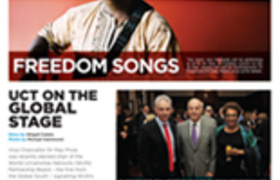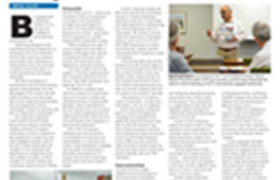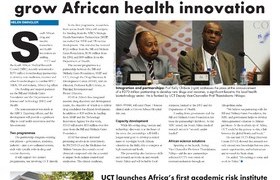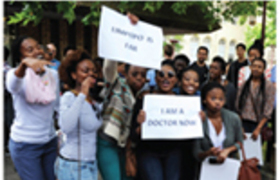After Freedom: Race, class and identity in SA's freedom generation
19 May 2014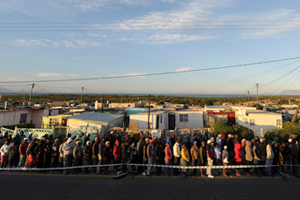
A rising cohort of young South African adults across the colour lines is looking for a new definition of the country of their birth, one not bound by race or class, says US scholar Professor Katherine Newman.
Newman was delivering the Vice-Chancellor's Open Lecture at UCT on 5 May, on the eve of the country's fifth general election and shortly after the launch of After Freedom: The Rise of the Post-Apartheid Generation in South Africa, co-authored with Ariane De Lannoy of UCT's Children's Institute.
The book created the backdrop for the lecture; two years of fieldwork that tracked the lived experiences of seven young adults – all children when apartheid fell – taking the team from the leafy suburbs of Cape Town, to Manenberg, the Northern Suburbs, Sea Point, and the backwaters of Seymour in the Eastern Cape.
For an audience preparing to vote in the undertow of Nkandla, Bekkersdal and the Marikana Enquiry, Newman's study provided a disquieting view of prospects for the 'freedom generation'.
Although politically free, they're still bound by the constraints of class and colour.
Shaken loyalty
"They're poised to inherit a country where democratic institutions and the popular vote prevail, but confidence in the political elites is shaky and the loyalties that infuse their parents' generation can no longer be taken for granted."
This generation is seeking a government that, while it acknowledges the injustices of apartheid, embraces a non-racial future and will "make good on the promises that were greeted with relief and celebration 20 years ago".
"The distance yet to be travelled on those promises, the deplorable corruption of public officials, what appears to be the loss of political fervour of Madiba's ANC, have all tarnished their faith and left them with more questions than answers."
Newman's work was informed by US anthropologist Hortense Powdermaker's book, After Freedom: A cultural study in the Deep South, which examined "people at the bottom of American society" 65 years after the American Civil War in the Deep South, in 1932, during the Great Depression. Powdermaker sought to understand how race relations had developed. But they had scarcely changed, and the class differences within each group were just as profound on either side of the colour line.
"Hierarchy was everywhere," Newman observed.
Twenty years after the first free election in South Africa seemed an appropriate time to ask similar questions here, she said.
"Deep portraits"
Based at the Children's Institute during the fieldwork, Newman and her team conducted "deep portraits" of communities in the Western Cape, through the eyes of the seven subjects; "who, while not statistically representative, might be thought of as archetypes of class position within the major ethno-racial populations of the regions".
These portraits showed that racial and class inequalities continue to impact people's daily lives, whether rich and privileged, or poor and disadvantaged.
"Black and coloured youth are especially vulnerable, with high levels of school dropouts and unemployment, and large numbers of discouraged work-seekers. In this they parallel the experience of their age-mates worldwide, as the toll of the downdraft of slow economic growth has pushed unemployment for young people in Europe, the UK, US and Asia to levels not seen since the 1930s," Newman added.
Bewilderment and anger
All seven spoke of the post-democracy era with bewilderment and anger. Amanda, a black woman with a Model C education, said she had lost the patience her mother had after the ruling party came to power. "The backlog in service delivery, the air of corruption and rudderlessness – she wonders what kind of ideals politicians believe in," said Newman.
Brandon, a young white man of modest means from the Northern Suburbs, can't understand why government is working so hard to put colour back into society. In the space of one generation, he feels he cannot aspire to the type of job his father had before employment equity squeezed him out.
But no young democracy can ignore the importance of watch points in its development, Newman said.
She cited the 1950s example of Central High School in Tuskaloosa, Alabama, the product of three schools integrating after a court order to do so. The new school soon entered a golden age, as national academic, sporting and cultural awards followed. Twenty years later, however – released from that order and court oversight – the school went backwards. Today it retains little of the golden era, a struggling facility with 99% poor black pupils.
Newman made the point that in that case, integration – and the benefits that followed − lasted only with vigilant enforcement. "When the pressure was off, the old patterns returned. Not exactly in the same form, but no less damaging."
Unfinished business
Newman believes the lesson is twofold: there's importance in social science for the kind of research embodied in After Freedom, which tries to bring to the public the "fruits of ethnographic enquiry, direct attention to the lived experience of ordinary people".
Second, and perhaps more importantly she believes, it tells us that what follows after a social revolution like the anti-apartheid movement, or the American civil rights crusade, is "rarely a straight line".
"It moves in the right direction only as long as people insist it must.
"As is true of a lot of democracies all over the world, including the one I come from, there's unfinished business here.
"It is a business of policy and of political confidence that waxes and wanes with the explosion of inequality. It is a business in which race and class intertwine to produce toxic combinations that threaten to undermine the progress we've made."
But there is hope.
"Despite their criticisms and lack of belief in the political elite, there is a strong belief in the country as a project, and a desire to find a place and identity that works within that project.
"Brandon, too, is looking for a way to think about himself, separated from the evils of the past. He may disavow responsibility for it, but he still feels like he needs to find some way of thinking about himself that's constructive inside the context of the country as it is today. "And that's the aspect of the book that we hope will be assuring and uplifting. There is a confidence in this country in this generation, even if that confidence doesn't extend to the ruling political elite."
 |
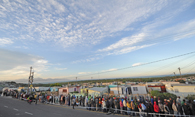 |
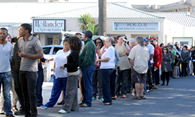 |
Story by Helen Swingler. Photo by Lulama Zenzile, Foto24.
 This work is licensed under a Creative Commons Attribution-NoDerivatives 4.0 International License.
This work is licensed under a Creative Commons Attribution-NoDerivatives 4.0 International License.
Please view the republishing articles page for more information.
News
Front page
Previous Editions
